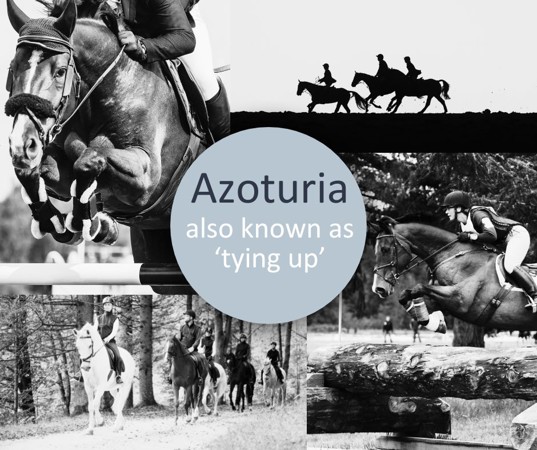LATEST NEWS
Azoturia, also known as Tying-Up
26 Dec 2024
Exertional Rhabdomyolysis (ERM) is also known as Azoturia, Tying-up, Set-Fast and Monday Morning Disease (traditionally happening after a busy weekend of high exercise). ERM is a disturbance of the normal functioning of the muscles in the horse, causing painful cramps and the breakdown of muscle tissue, primarily in the back and hindquarters. AZOTURIA CAN ONLY BE DIAGNOSED BY TAKING BLOODS FROM YOUR HORSE TO CHECK THE MUSCLE ENZYMES. WE CAN DO THIS AT THE SURGERY.
Causes
Azoturia often occurs due to a combination of factors, including:
- Excessive Energy Storage: Feeding high levels of carbohydrates to horses with low exercise levels can lead to abnormal glycogen storage in the muscles.
- Genetics: Some breeds, may have a genetic predisposition to tying-up, especially those with recurrent exertional rhabdomyolysis (RER) or polysaccharide storage myopathy (PSSM).
- Sudden Exercise Changes: Overexertion after a period of rest, a period of rest after overexertion, or irregular exercise routines can trigger episodes.
- Electrolyte Imbalances: Dehydration or deficiencies in calcium, potassium, or sodium can exacerbate muscle dysfunction.
Symptoms
- Stiffness and reluctance to move, often during or after exercise.
- Firm, painful muscles in the hindquarters.
- Sweating and increased heart rate.
- In severe cases, the horse may refuse to move or show signs of dark-coloured urine due to muscle breakdown.
Treatment / Management
- Contact your vet: If you suspect Azoturia your vet should be called immediately, this is a veterinary emergency.
- Stop Exercise Immediately: Prevent further muscle damage by ceasing all activity at the first signs of tying-up.
- Pain Management: Administer anti-inflammatory medications as prescribed by your vet.
- Rehydration: Provide water or electrolyte solutions to correct imbalances. Intravenous fluids may be necessary in severe cases.
- Muscle Relaxants: In some cases, a vet may prescribe drugs to relax the muscles and alleviate spasms.
- Monitoring: Keep the horse calm, warm, and in a stable until the symptoms subside, avoiding stress or movement that could worsen the condition. THE ONLY WAY TO CONFIRM THAT YOUR HORSE IS READY TO RE-START EXERCISE IS FOR A VET TO TAKE FURTHER BLOODS AND ADVISE.
Aftercare and Prevention
- Gradual Exercise: Develop a consistent exercise routine to avoid sudden exertion.
- Diet Management: Feed a diet low in carbohydrates and high in fat to reduce glycogen accumulation in susceptible horses. Supplements like vitamin E and selenium may also help.
- Genetic Testing: For horses with recurring episodes, testing for PSSM or RER can be useful.
- Electrolyte Balance: Ensure the horse has access to salt blocks and fresh water to prevent dehydration.
If you suspect Azoturia your vet should be called immediately, this is a veterinary emergency. 0808 168 5580 or 01254 888 600
Do not hesitate to give us a call if you have any concerns about your horse or pony. 0808 168 5580 or 01254 888 600.
